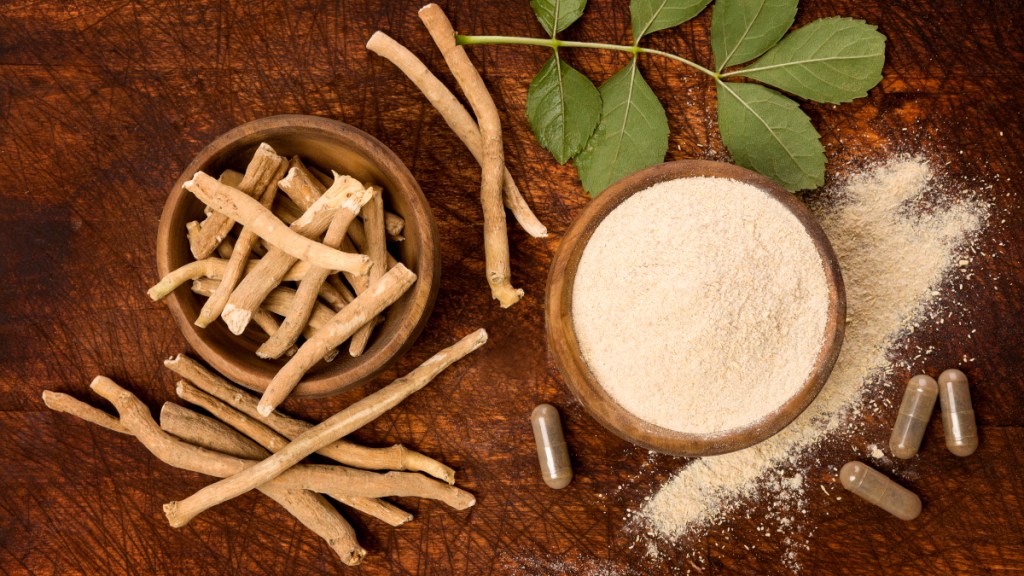Tossing and Turning at Night? Ashwagandha Is an Ancient Herb That Deepens Sleep Naturally
See why one doctor recommends it to his patients battling burnout, too

We all know the importance of getting our beauty sleep — at least seven hours per night for optimal health and happiness, experts say. For many of us, though, we spend more time dreaming about getting enough sleep than actually catching Zzz’s. Instead of counting sheep, consider reaching for ashwagandha for sleep. Experts say the ancient Ayurvedic herb can help lull you into dreamland naturally. Learn how it works and how the best way to take it, plus discover more ways ashwagandha benefits women.
What is ashwagandha?
“Ashwagandha is a shrubby plant native to Asia and Africa,” explains Zachary Mulvihill, MD, a physician at Integrative Health and Wellbeing at NewYork-Presbyterian. “The roots are dried and ground into a powder that has been used as part of Ayurveda, or traditional Indian medicine, for thousands of years.”
Also known as Indian winter cherry or Indian ginseng, ashwagandha is an adaptogen. As the name suggests, adaptogens help you and your body better “adapt” to and cope with stress. That includes helping you let go of you worries so it’s easier to drift off to sleep.

The benefits of taking ashwagandha at night
Struggling to summon the Sandman? Ashwagandha supplements can help. As Dr. Mulvihill notes, the role of our sympathetic nervous systems is to help us fight or flee from predators (hence being dubbed the “fight or flight” system). In modern times, though, our bodies often respond to professional emails and street sirens as if they’re physical threats.
Being in a continuous state of fight or flight can wreak havoc on your sleep by increasing levels of the stress hormone cortisol, which plays a role in the sleep-wake cycle. That’s where ashwagandha for sleep comes in.
“There is limited research on the effects of ashwagandha for sleep, but a few recent studies suggest that it may help promote sleep by calming stress and anxiety,” says licensed clinical psychologist Shelby Harris, PhysD, Director of Sleep Health at Sleepopolis. “It may do this by lowering stress hormones like cortisol to help the body relax.”
Case in point: a small study in Cureus found that folks who took either 125 mg or 300 mg of ashwagandha twice daily for two months had lower levels of perceived stress and less cortisol in their blood. Plus they reported a boost in sleep quality. Other studies also suggest that ashwagandha reduces anxiety by building resistance to stress, making it easier to doze off at night. (Click through to learn how de-stressing can also ease restless leg syndrome for better sleep, and to find out if falling asleep after eating is a sign of diabetes.)

Related: This Arctic Herb Shows Great Promise In Treating Tiredness and Depression
How to use ashwagandha for sleep
Ready to add ashwagandha to your sleep regimen? “Taking ashwagandha before bed, about 30 minutes to an hour earlier, could help relax you for better sleep,” suggests Dr. Harris. “Using it daily might work, but start with a small amount and increase slowly to see what suits you best.”
She suggests talking to your doctor or following the dosage guidelines on the product itself. Dr. Mulvihill has similar advice, emphasizing the importance of staying at a low dose for about a week to make sure you don’t have any side effects or interactions.
“You can take 500 mg at 9 PM for 1-2 weeks,” he advises. “If you start to notice benefit at a lower dose, you can stay at that dose. Don’t increase your dose beyond 1,000 mg without talking to a provider. The KSM extracts [a high-concentration, full spectrum form of ashwagandha] can be stronger, so start with 300 mg at 9 PM,” if you’re going that route.
Note: Dr. Mulvihill adds that some people find ashwagandha activating. Instead of taking ashwagandha at night, these people may prefer to take it in the morning instead, he notes.
Choosing an ashwagandha supplement
“I don’t recommend taking any herb or supplement that is not produced domestically in the U.S. and that is not USDA organic,” Dr. Mulvihill says. “Contamination with pesticides and heavy metals is a serious concern. Never take any ashwagandha supplement that contains anything besides the root of the plant.”
Supplements are regulated pretty loosely in the United States, so Dr. Harris recommends sticking to reputable, popular brands that prioritize quality and choosing only products that are independently tested for purity and potency. One option that fits the bill: Gaia Herbs Organic Ashwagandha Root (Buy from Amazon, $37.51).

Who should avoid ashwagandha for sleep?
Ashwagandha is safe to take for up to three months, but there’s not yet enough evidence to support its safety beyond this point, notes Dr. Harris. Still, there are certain people who should steer clear of taking ashwagandha for sleep altogether.
That includes people who have a surgery coming up within a few weeks, those with autoimmune or thyroid issues, women who are pregnant or nursing and people who have allergies to plants in the nightshade family (such as potatoes and tomatoes). Dr. Harris advises against giving ashwagandha to children unless their doctor gives the OK.
Ashwagandha can also interact with certain supplements and medications, including sedatives, thyroid medicines and medications for diabetes, seizures, high blood pressure and the immune system. According to Dr. Harris, it’s always important to consult your doctor before taking ashwagandha, but this is especially true if you have a medical condition or take medications or supplements.
Potential ashwagandha side effects
While most people enjoy ashwagandha without any trouble, it may cause mild side effects like nausea or stomach upset. In rare cases, it can cause complications like allergic reactions, difficulty breathing and severe liver failure. “If someone has severe symptoms or new issues after taking it, they should stop and see a doctor,” says Dr. Harris. “Your health comes first, so get advice if something doesn’t feel right.”
More ashwagandha benefits for women
Ashwagandha is best known for its ability to improve sleep, stress and anxiety. But research suggests those aren’t the ancient herb’s only perks. Here, 4 more ways ashwagandha benefits women.
1. It beats burnout
Often feel fatigued and burned out? Ashwagandha can help. In a small trial in The Journal of Psychopharmacology, those who tooke 200 mg of ashwagandha root extract twice per day saw an improvement in fatigue and related symptoms.
“If we treat the stress-driven anxiety and insomnia, then naturally the fatigue or ‘burnout’ that these are producing will improve,” explains Dr. Mulvihill. “Chronic fatigue is one of the most common conditions I treat, and ashwagandha is the herb that I use most often to treat patients who I feel have this type of stress/dysregulated circadian rhythm type of fatigue.” (Click through to learn how ashwagandha improves your thyroid health, too.)

2. It sharpens focus
It’s no surprise that when you’re anxious and low on sleep, your mind feels a little fuzzy. It’s not surprising, then, that ashwagandha can help boost your concentration and ward off pesky brain blips. “Basically, ashwagandha helps to rest and reset our nervous system,” explains Dr. Mulvihill. “So it tends to help improve the brain fog that is associated with anxiety and insomnia.”
Though Dr. Mulvihill notes he doesn’t use ashgwagandha in healthy patients for “cognitive enhancements”, he cites two small studies that suggest ashwagandha may improve cognitive health. The first in The Journal of Clinical Psychiatry found those who took 500 mg of ashwagandha daily for two months had better scores on tasks related to auditory-verbal working memory, reaction time and social cognition.
The second article in The Journal of Dietary Supplements studied adults with mild cognitive impairment. The results? Those who supplement wtih 300 mg of ashwagandha root extract twice daily for two months had better immediate and general memory than those taking a placebo. (Click through to more easy ways to get rid of brain fog fast.)
3. It strengthens muscles
Strong, healthy muscles are key to staying active and independent for years to come. You already know that a healthy diet and exercise routine is key, but it turns out ashwagandha can aid your efforts, too. “There is some evidence for this, but the studies are small,” says Dr. Mulvihill.
These studies suggest that ashwagandha may increase muscle strength gained from your fitness routine. In an eight-week study in The Journal of the International Society of Sports Nutrition, folks who took 300 mg. of ashwagandha extract twice daily increased their muscle size and strength more than those who didn’t supplement with the ancient herb.

4. It balances blood sugar
While ashwagandha won’t prevent diabetes, it may help keep your blood sugar levels in check. Early research suggests that the ancient herb supports glucose control, which would mean fewer blood sugar spikes and sustained weight loss.
How does ashwagandha help? It all circles back to cortisol. “Ashwagandha does have some evidence for lowering blood sugar, likely because it helps to normalize cortisol levels,” explains Dr. Mulvihill. He notes that high cortisol levels can raise your blood sugar. But by regulating your cortisol levels, your blood sugar levels might benefit, as well. (Click through to see how the chlorogenic acid in coffee balances your blood sugar, too.)
Note: Taking ashwagandha in addition to diabetes medication can cause your blood sugar levels to drop too low. Be sure to talk to your doctor before using ashwagandha if you take these medications, and keep a close eye on your blood sugar levels.
For more natural ways to improve your sleep:
Too ‘Wired and Tired’ To Fall Asleep? MDs Explain Why It Happens — And the Easy Fixes
This content is not a substitute for professional medical advice or diagnosis. Always consult your physician before pursuing any treatment plan.













